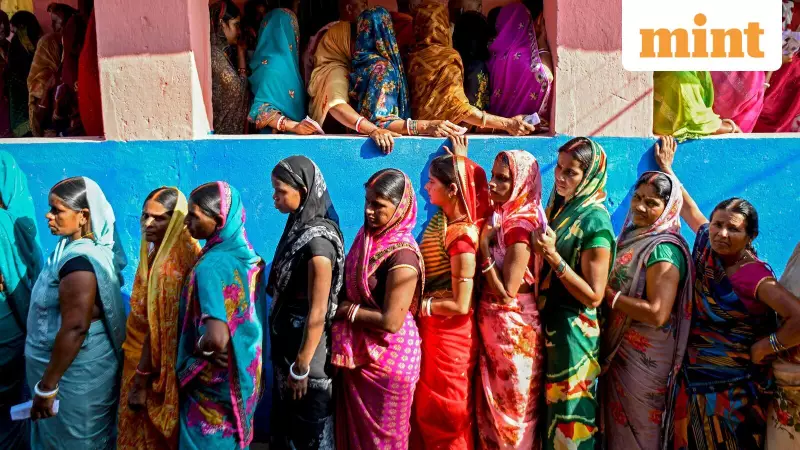
Every election season in Bihar promises a fresh start and renewed hope for development, yet the state continues to languish at the bottom of India's economic and social indicators. Despite numerous campaigns centered on progress, the reality remains unchanged since Independence - while political careers have flourished, genuine advancement for ordinary citizens has remained elusive.
The Stark Contradictions of Bihar's Economy
Bihar presents one of India's most puzzling development paradoxes. The state boasts one of the country's youngest and most entrepreneurial populations, with its migrant workers forming the backbone of urban construction and manufacturing across India. The remittances they send home fuel consumption patterns throughout eastern India. However, these contributions mask a troubling domestic reality.
Bihar's per capita income stands at barely one-third of the national average, while literacy rates, healthcare infrastructure, and basic amenities consistently rank among the worst performing of all major Indian states. The agricultural sector, which employs over 60% of the workforce, contributes only about 20% to the state's output, while manufacturing accounts for a meager 10%. This economic imbalance has turned migration into Bihar's silent economic stabilizer, simultaneously easing unemployment pressures while draining the state of its most ambitious youth.
Institutional Failure and the Rise of Populism
The core of Bihar's stagnation lies in its institutional decay. Schools operate without adequate teaching staff, hospitals function without doctors, and roads crumble without proper maintenance. When competitive elections fail to produce accountability, politics transforms into a contest over resource control rather than effective utilization.
This governance vacuum has created fertile ground for populist policies to thrive. When the state fails to deliver essential services, political parties resort to distributing quick fixes - subsidies, caste-based favors, and symbolic gestures that provide immediate political returns but fail to address structural problems. This creates a vicious cycle where poor governance breeds populism, and populism further entrenches ineffective governance.
Progress Without Prosperity: The Consumption Conundrum
Bihar has witnessed some measurable progress in recent decades. Two decades ago, the average Bihari household spent only about three-fourths of what an average Indian household consumed. Today, that figure has improved to nearly nine-tenths. The state's poorest households now consume slightly more than equally poor families in other regions.
Significantly, Scheduled Caste, Scheduled Tribe, and backward-class groups have narrowed most consumption gaps, while Muslim households, once considerably behind, have nearly reached parity. However, this equalization hasn't translated into economic vitality. The middle class is shrinking even as poorer households catch up. Families dependent on salaries or small businesses spend considerably less than their national counterparts, while agricultural households have improved mainly through welfare transfers, rural wages, and remittances.
A Roadmap for Bihar's Renaissance
The path forward requires a fundamental shift from redistribution to productivity, from welfare politics to wealth creation. The first crucial step involves making governance measurable through outcome-based budgeting systems where each department sets clear annual targets for reducing maternal mortality, improving educational outcomes, raising farm incomes, and maintaining infrastructure.
Decentralization must accompany these reforms. Local bodies in Bihar currently have electoral representation but minimal fiscal authority, directly managing only a small fraction of development spending. Allocating a fixed share of plan budgets directly to panchayats and municipalities that prepare three-year development plans through public consultation could dramatically improve accountability.
The establishment of District Development Cells comprising professional teams of engineers, planners, and accountants would enhance local bodies' capacity to design and monitor projects effectively. When financial authority and decision-making power converge at the grassroots level, accountability becomes visible and tangible to citizens.
Transforming Rural Bihar into an Economic Engine
Bihar's rural economy represents both its greatest strength and most significant vulnerability. The primary challenge extends beyond productivity to profitability, with farmers often receiving less than half the consumer price due to weak logistics, limited storage capacity, and inadequate processing facilities.
Scaling up Farmer Producer Organizations and creating modern rural aggregation hubs with cold storage, grading facilities, and digital price discovery mechanisms through cooperative or public-private partnerships could revolutionize agricultural economics. With improved infrastructure and market access, Bihar could emerge as eastern India's agricultural processing hub, generating thousands of non-farm employment opportunities.
The state needs a rural development initiative as ambitious as India's Smart Cities Mission, given that approximately 90% of Biharis still reside in villages. A Smart Village Mission could provide the foundation for a more balanced future, combining reliable roads and power with solar lighting, broadband connectivity, clean water, digital governance, and skill development centers.
Each village cluster could function as a local growth hub, connecting farmers, educational institutions, small enterprises, and service providers through shared infrastructure. By treating rural Bihar as a growth engine rather than a welfare recipient, the state could reduce migration pressures, create local employment, and expand opportunities within communities.
The Transparency Imperative
None of these reforms can succeed without transparency. Bihar must make governance visible before it can become accountable. While technology cannot substitute for political will, it can reveal expenditure patterns and performance metrics. Political transformation will only occur when citizens begin rewarding performance instead of patronage.
Bihar's fundamental challenge has never been poverty itself but the persistence of poverty by design. The state possesses ample ambition and talent but lacks institutions that reward results. The next government must demonstrate that governance, not giveaways, earns public trust. Three generations after Independence, Bihar deserves a second freedom - liberation from low expectations through accountable governance, thriving smart villages, and a political culture that finally values delivery over distribution.






